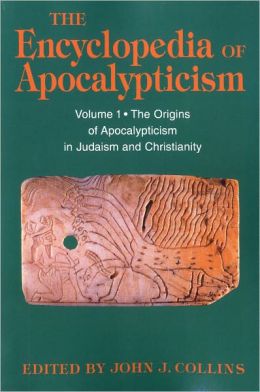This was a difficult topic for me because I'm still struggling a lot with the difference between the spiritual Jesus that I was brought up to worship as God, and the historical Jesus who was most likely an apocalyptic preacher. (Though I have decided to keep these two versions of Jesus separate in my mind, for now.) I took the time to read The Eschatology of Jesus, by Dale C. Allison.
 |
| The Encyclopedia of Apocalypticism, Volume 1
Chapter 8: The Eschatology of Jesus, by Dale C. Allison
|
Allison surveys current arguments for and against Jesus' eschatology. He then demonstrates that the New Testament has undeniable eschatological imagery and phrasing. He points out that although it's possible that the authors of the New Testament had eschatological leanings when Jesus did not, there's no reason to believe that they mistakenly, or intentionally, changed Jesus' message; therefore, it is very likely that Jesus was an apocalyptic preacher.
As I thought about my assignment, however, I pondered the possibility that perhaps the authors wrote the passages about the destruction of the Temple after the fact, and then attributed the words to Jesus in order to help make sense of the tragic destruction of Jerusalem by Rome. Did Jesus really foresee the destruction of the Temple? Or were the authors of the Gospels trying to provide spiritual guidance to their people during a time of great turmoil?
In the end, I decided that, since this prophecy isn't the only eschatological speech Jesus made, he was very likely an apocalyptic preacher - regardless of whether he believed the end of the world was nigh. I plan to read some more on this subject before fully making up my mind, though.
What does everyone else think? Was Jesus an apocalyptic preacher? Did he believe the end of the world was coming in the near future? Were certain passages of the Gospels written by people who retroactively attributed a prophecy of the Temple's destruction to Jesus?
Great commentary as always Rachel.
ReplyDeleteWithout a doubt my reading of the Gospels would lead me to conclude that Jesus was a preacher who talked about and predicted the end of the world. I do think that it goes a little further. It seems that the end of time on Earth was a key l part of God's plan. It was necessary in order for salvation and resurrection to come. This Jesus did not only predict this, but it is an essential part of Christian theology.